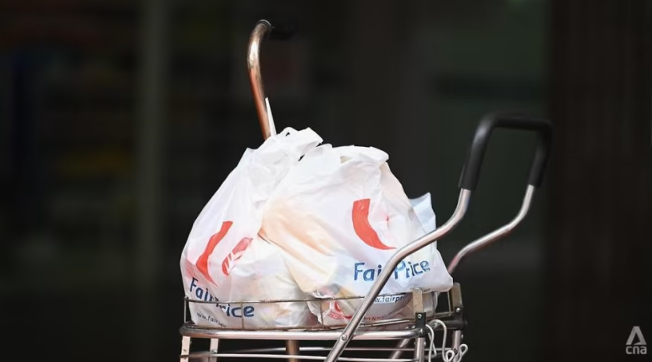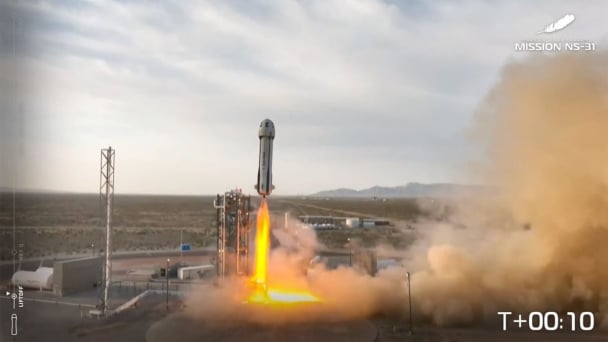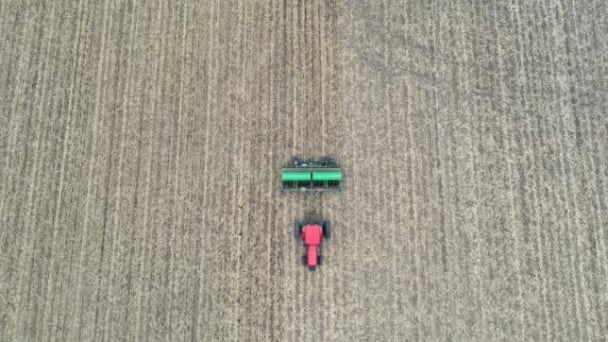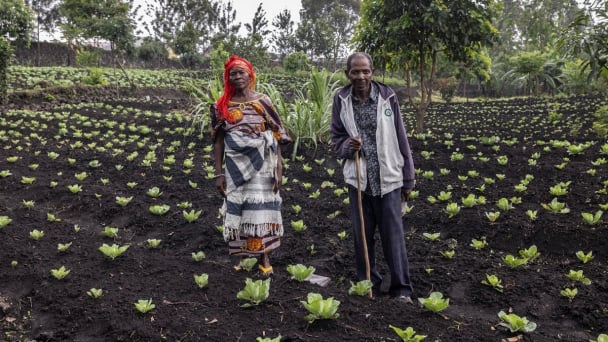April 15, 2025 | 22:06 GMT +7
April 15, 2025 | 22:06 GMT +7
Hotline: 0913.378.918
April 15, 2025 | 22:06 GMT +7
Hotline: 0913.378.918

Groceries from an NTUC FairPrice outlet. Photo: CNA
From Jul 3 this year, customers will have to fork out at least 5 cents for each plastic bag that they take from large supermarket operators.
Announcing the date in Parliament on Thursday (Mar 2), Senior Minister of State for Sustainability and the Environment Amy Khor said that about 400 - or two-thirds - of all supermarkets in Singapore will impose the charge, which applies to disposable carrier bags of all materials.
The charge will not apply to non-carrier bags such as flat-top plastic bags for fresh produce, meat or seafood.
The Bill to make the bag charge compulsory at large supermarkets was tabled for a first reading in Parliament on Feb 6 this year. Called the Resource Sustainability (Amendment) Bill, it is meant to reduce food waste and packaging in Singapore.
"Following consultations with supermarket operators, we understand that the majority will be charging 5 cents per bag, and this would moderate potential cost impact on consumers," said Dr Khor.
"By making the cost of disposable carrier bags visible to consumers, the charge will nudge consumers to be mindful of and reduce their usage of disposables."
The bag charge - which begins on a Monday - will apply to supermarket operators with an annual turnover of more than S$100 million. These include NTUC FairPrice, Cold Storage, Giant, Sheng Siong and Prime Supermarket.
Supermarket operators with an annual turnover of less than S$100 million are encouraged to voluntarily impose their own bag charges and many have done so, said the National Environment Agency (NEA) and the Ministry of Sustainability and the Environment in a joint press release.
"Whether they are made of paper, plastic or degradable materials, disposables have an impact on our environment during their production, transportation, and disposal. Consequently, shoppers are encouraged to reduce their use of all types of disposable carrier bags, regardless of material type," said NEA.
To ensure transparency and accountability, supermarket operators will be required to publish information on the number of bags issued, the proceeds received from the bag charge and how these proceeds are used. They are encouraged to channel the proceeds into social or environmental causes.
"NEA has been engaging the relevant supermarket operators on devoting part of the proceeds to support the shift towards using fewer disposable carrier bags, and encouraging shoppers to bring their own bags, or on programmes that will benefit the local community," the press release stated.
Dr Khor said that while the mandatory charge will not apply at other retail outlets such as convenience stores, many businesses already charge for bags voluntarily, including large convenience store chains such as 7-Eleven and Cheers. "We will monitor the effectiveness of the charge and assess the need to expand the mandatory coverage in the future," she added.
The decision to implement a bag charge comes after years of public and parliamentary debates on its effectiveness as well as nationwide campaigns aimed at reducing the excessive use of plastic bags and disposables.
It was one of the recommendations given by a citizens’ workgroup convened in September 2020 on reducing excessive consumption of disposables. NEA then consulted close to 6,000 stakeholders from the industry and the public, including low-income groups and representatives from the social services sector.
In September 2021, NEA conducted a survey of 1,000 Singapore residents and close to 90 per cent agreed they had a part to play in reducing the use of disposable bags. More than 80 per cent agreed that the excessive use of these bags had a negative impact on the environment while more than 70 per cent agreed that a mandatory charge will reduce usage.
(CNA)

(VAN) 169 lotus seeds selected by the Vietnam Academy of Agricultural Sciences were carried into space by Vietnamese-American astronaut Amanda Nguyen.

(VAN) Tariffs are making life more expensive for John Pihl. He's been farming in Northern Illinois for more than 50 years.

(VAN) European and American farmer organisations are concerned about the import tariffs that the United States introduced on 9 April for products from the European Union. This makes them 20% more expensive.

(VAN) Global poultry trade is expected to remain strong amid relatively tight global protein supply and growing consumption, RaboResearch concludes in its latest animal protein report.

(VAN) Traditional methods benefit hundreds of species but as new agricultural techniques take over, the distinctive haystacks mark a vanishing way of life.

(VAN) The nation’s top banks are quietly advising their clients on how to build a financial life raft - or perhaps life yacht - from the wreckage of runaway climate change.

(VAN) From FAO Office in the Democratic Republic of the Congo.